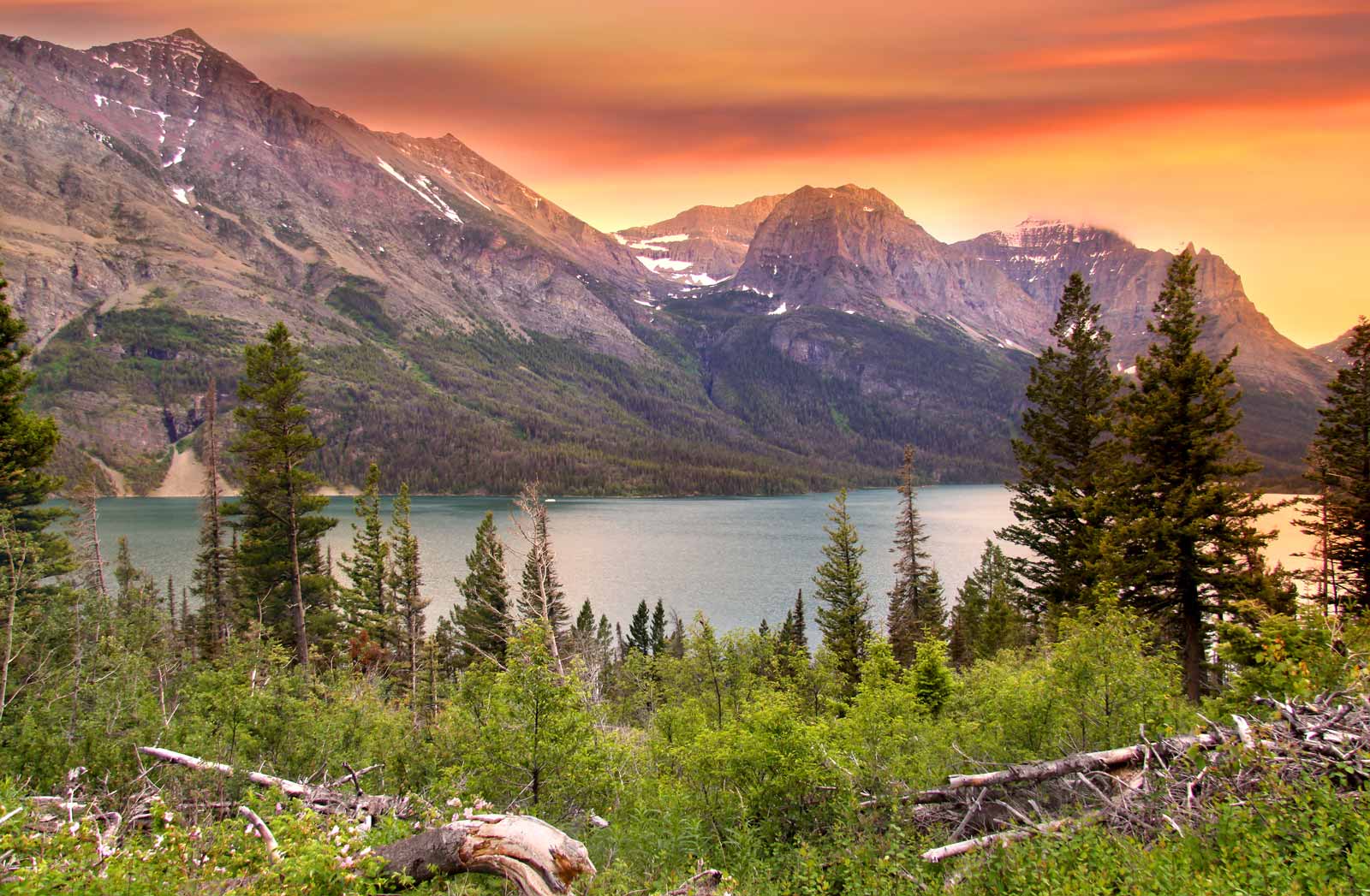16 of the Best Glacier National Park Hikes
Located in Montana, Glacier National Park offers many great hiking experiences. The park is full of amazing natural wonders of fresh blue lakes, imposing mountains and awe-inspiring glaciers. With more than 700 miles ... Continue Reading Read the original post 16 of...

Located in Montana, Glacier National Park offers many great hiking experiences. The park is full of amazing natural wonders of fresh blue lakes, imposing mountains and awe-inspiring glaciers.
With more than 700 miles of both short hikes and extended backpacking trails, it’s easy to find one you’ll love. Here are my picks for the 16 best Glacier National Park hikes. This post was originally written by Julie from Outdoorzer who shared her shared her must-see trails when you visit Glacier National Park and The Planet D team has added more variety to help you plan your trip.
Hiking Glacier National Park
Before you start your hike, plan for a safe hiking experience. Stop at the park’s visitors center to get all the information you need, recommendations from the guides, and any special warnings. Visit the National Park website for closures and more information.
When hiking Glacier National Park: Be aware of bears and cougars (mountain lions) and use proper safety precautions. Hiking in groups or pairs lowers the risk, make noise, and don’t leave any food out to attract animals.
Plus, don’t forget to let someone know where you are going. Be sure to have enough water, food, and supplies should anything happen. We always carry a basic first aid kit when hiking. But most importantly, bring a sense of adventure and have fun when you try one of these amazing hikes.
1. Ptarmigan Tunnel
The Ptarmigan Tunnel is a full day Glacier National Park hike. This is an incredible trail, because when you come out at the other side of the tunnel, you feel like you’ve walked into another world.
When passing through this 240-foot tunnel, you hike through big meadows filled with wildlife as well as a dense forest. Keep in mind that this tunnel was built for horses during the 1930s and it’s full of various slopes and edge ridges.
After you pass Ptarmigan Falls, the trail gets a lot steeper, so be prepared for some tough hiking during this section. It then continues for about 1.6 miles to Ptarmigan Lake, where you can relax and admire some of the most beautiful scenery in the area. Be prepared for a long day.
2. Swiftcurrent Pass
This is a difficult Glacier National Park hike but it’s worth it for the great scenery. This hike passes by three lakes and a spectacular waterfall. Throughout your hike, you may spy on some of the rarest and most colorful birds throughout the six lakes.
You will also see the gorgeous Granite Park. In fact, during this hike, you can get some of the most incredible images of the blue lake and the surrounding mountains. If you like, stop at Fishercap Lake, where you might see moose in the mornings or early in the evening.
3. Iceberg Lake
This is one of the most popular hiking experiences in Montana’s Glacier National Park. It also gives you the opportunity to see icebergs floating in an alpine lake. When you hike here you pass through many open areas along the way that give you outstanding vistas of the peaceful mountains around you.
This hike takes about 4-hours to complete and begins on the same trail as the Ptarmigan trail. It then veers off to the left at the junction. Be aware of grizzly bears on this hike.
Location: Iceberg Ptarmigan Trailhead Length:Round Trip: 9.7 miles Average Gain: 1275 Feet4. Cracker Lake
Cracker Lake is considered to be one of the most beautiful lakes in the world. The amazing color of the lake is a crystal clear aqua blue and makes all the scenery around you even more wonderful.
Location: Trailhead starts at Many Glacier Hotel Length: Round Trip: 12.6 miles Elevation Gain: 1400 FeetLooking for a more in depth guide to Glacier National Park Hikes? Pick up a copy of Glacier National Park Must Do Hikes for Everyone for only $10.99 on Amazon
5. Pitamakan Pass Trail
This peaceful trail goes over the ridge of Rising Wolf Mountain, passes a waterfall from Sky Lake, and ends up at Oldman Lake. From there the trail switchbacks up to Pitamakan Pass. Keep in mind though that due to the snow, this won’t likely be passable until late July or even August.
Here you can climb up the high hills, then drop back down, nearly 3,000 feet. You also have to hike a very narrow trail so be prepared. Expect a long and full day
Location: North Shore Trailhead Length: Round Trip: 15.4 miles Elevation Gain: 2500 feet6. Grinnell Glacier Trail
This hike takes you to one of the most iconic glaciers in the park. You pass various lakes, amazing meadows, and stunning cliffs along the way. The first half of the hike is easier than the second half. It then becomes more difficult as it rises steeply with several slopes.
But it is worth it as you can see some amazing vistas over Grinnell Falls, Angel Wing, and Grinnell Lake. The hiking path is well maintained and you may encounter wildlife sightings along the way. No pets allowed
Location: Grinnell Glacier Trailhead Length: Out and Back: 7.6-miles Elevation Gain: 1840 Feet7. Siyeh Pass
This trail hike begins in a forest and takes you to various peaks. Hike the rocky slopes and then go down through more meadows to the Sunrift Gorge. Follow the trail through the trees for about 2.5 miles and then head up to Preston Park.
Be sure to take a bit of time to admire the beautiful scenery all around you before you descend over 3,000 feet for the next 5.4 miles where you will end up at the Sunrift Gorge.
Length: Round Trip: 8.9 miles Elevation Gain: 2090 Feet8. Two Medicine Area
Located on the north part of the city of East Glacier, this incredible area offers more jaw dropping scenery and some great hiking. The trails are more peaceful than the ones at the starting point (located near the Many Glacier hotel). It’s a good are to hike in Glacier National Park if you are a beginner.
You can also take a wooden boat tour in this area and you can find some fantastic camping. At roughly 1.5 miles you emerge from the forest to be greeted by lush meadows and other vegetation. During your hike, you will pass through a large open meadow and open terrain with colorful wild flowers. If you wish, you can spend the night camping here.
Location: Two Medicine Entrance Two Medicine day hikes include, Appistoki Falls, Aster Falls, Aster Park Overlook9. Dawson Pass
Hiking the 15-mile Dawson Pass takes you up to amazing views of Oldman Lake. This trail crosses the Dawson and Pitamakan passes taking you through peaceful scenes and waterfalls along the way. If you want to shave some time off your hike you can take the shuttle boat across Two Medicine Lake.
Location: North Shore Trailhead Length: 6.5 miles Elevation Gain: 2450 feet10. Hidden Lake Trail
While the Hidden Lake Trail is a fairly short trail, the altitude makes it quite challenging. The trail is completely open, expect lots of sun and wind as you walk through alpine meadows. Depending on the season, you might even have to work across snowfields.
Keep an eye out for marmots, and big-horn sheep. Mountain goats are common on this trail and spotting one makes it quite the adventure. Grizzly bears have been seen in the area as well. At the overlook, you’re rewarded with panoramic views of the nearby mountains, lake, and wildflowers, however, it can be very busy at the overlook. A truly breathtaking experience that makes your Hidden Lake hike well worth it. If you can, carry bear spray and a hiking pole.
Location: Logan Pass Visitor Center Elevation gain: 1325 feet (403 feet) Total round trip miles: 5.4 miles (8.9 km)11. Avalanche Lake
This hike starts at the Trail of Cedars trailhead. While it is an uphill climb you will be rewarded with one of the most breathtaking views. The terrain on this trail is not challenging making avalanche lake one of the most popular hikes for all ages.
There are lots of trees along the trail that keep it cool with some more than 500 years old. You’ll pass a bridge that crosses Avalanche Gorge and be treated to views of Bearfoot Mountain jutting out from behind Avalanche Lake.
Take some time to set up a picnic and take in the picturesque of the lake and the waterfalls as you enjoy the varied landscape of the avalanche creek and forest. While the water at the lake is mostly ice-cold and not ideal for swimming, you dip your toes in to relax and cool down.
Location: Glacier Road north of Lake McDonald Elevation gain: 757 feet Avalanche Lake Distance: 5.9 miles12. Trail of the Cedars
Trail of the Cedars has no hills or steps to climb and is one of two wheelchair-accessible trails at Glacier National Park. It’s an easy trail with beautiful views of cascading waterfalls and snow-covered peaks. Walk among shadows of giant cedar, black cottonwood, hemlock, and yew trees. The paths are wide and can accommodate many people at once. Getting a parking spot can be challenging as this hiking trail is very popular among visitors.
Location: Lake McDonald Elevation gain: 60 feet Total round trip miles: 1.013. Highline Trail
Highline Trail is probably one of the spectacular hikes at Glacier National Park. However, it is not for the faint of heart. If you’re scared o heights you may want to pass on this trail as on the first quarter mile you come across a steep ledge. There is a hand cable to assist you on this stretch, however, it can be quite nerve-wracking especially when it gets windy.
Don’t let this discourage you as this trail rewards you with spectacular views of Glacier National Park, the forested valley, waterfall cascades, alpine meadows, and wildflowers. You might even spot some wild animals.
You don’t need to do the entire one way trip, many people turn around halfway at Haystack Butte or Granite Park Chalet.
Location: Logan Pass Visitor Center Elevation gain: 1950 feet Total One-Way Trip Miles: 11.814. Grinnell Glacier Overlook
If you’re looking for a challenge, try the Grinnell Glacier Overlook, which is probably one of the most strenuous hiking trails at Glacier National Park. Starting the hike at the Logan Pass Visitor Center where the Highline Trail starts. Located southeast of the Granite Park Chalet it takes you to the Continental Divide.
Set out early before the sun gets too hot as the first three miles are open with no shade. Sunscreen and hats are a must-have on this stretch. Bring lots of water and a pair of good hiking shoes as the trail can take some time- about 7 hours or more depending on your speed. A trekking pole will make your hike easier.
The trail is popular with seasoned hikers and can be quite busy, there are also parts with narrow edges and steep drop-offs that be quite nerve-wracking. You might spot some mountain goats and even grizzly bears down in the alpine meadows in the Chalet area.
Location: Highline Trail Elevation gain: 2830 feet Total trip miles: 15.515. Upper McDonald Creek Trail
The Upper McDonald creek trail is among the easier hikes at Glacier National Park. It’s an easy route in the woods that can be completed in under 2 hours. Perfect if you’re looking for a peaceful meditative hike.
The terrain is mostly flat and very smooth making it popular among bird watchers and for horseback riding. The hike begins with scenic views of waterfalls, creeks, and the forest. There is lots of shade available which keeps the trail very cool. If you’re lucky, you might spot a moose or deer on the trail.
Location: Lake McDonald Elevation gain: 210 feet Total out and back miles: 5.3 Miles16. Swiftcurrent Lake Nature Trail
The hike begins at the many glacier hotel boat dock or at the Grinnell Glacier trailhead just near the picnic area. The hike is fairly easy and can be completed in an hour as a large portion of the route is paved. It’s a great route for the whole family to enjoy a nice and relaxing hike with beautiful views all around for photos. Take a moment to enjoy beautiful views of the lake and the surrounding mountain peaks. Carry with you bear spray as there is a lot of bear activity in the area.
Location: Many Glacier Elevation gain: 25 feet Total round trip miles: 2.7Likes in Glacier National Park Map
Tips for Hiking Glacier National Park
When hiking in the backcountry, it is best to hike in groups. There is a lot of wildlife in Glacier National Park including Grizzly bears. When hiking with a group, make noise, keep talking and let the wildlife know you are there so that you don’t startle them.
Get a Steripen or LifeStraw to fill your water bottle with purified water. Make sure you have a bottle holder on your backpack and keep it full. I like to carry two bottles of water that I can refill by using my Steripen.
Pack layers. You will be going through elevation gains and the weather can change from hot to cool, so wear lightweight breathable clothing that can be easily layered with a rain jacket and a mid-layer of merino wool.
Make sure your hiking boots are well broken in and use them before you go hiking into Glacier National Park.
Always let someone know where you are going before hiking and check with the website and ranger station to see what the conditions are.
And there you have it, my favorite 16 Glacier National Park hikes. Remember, you don’t have to finish any of these hikes as there is always an opportunity to turn around.
Give yourself enough time when hiking to make it back before the sun goes down and don’t hike beyond your limits. Glacier National Park has hikes for everyone, so be smart and hike within your capabilities. Start small and have fun!
Did you know Glacier National Park in the United States is connected to Canada’s Waterton Lakes National Park? The two parks are known as the International Peace Park, they are a UNESCO World Heritage Site, and a Biosphere Reserved rolled all in one. It’s the only one of its kind in the world.
This post was originally written by Julie Mclain of Outdoorszer. It has been updated by The Planet D Team.
Thinking of doing some Glacier National Park hikes? Pick up the complete guide to hiking Glacier and Waterton Lakes National Parks on Amazon.

 Tekef
Tekef 
































